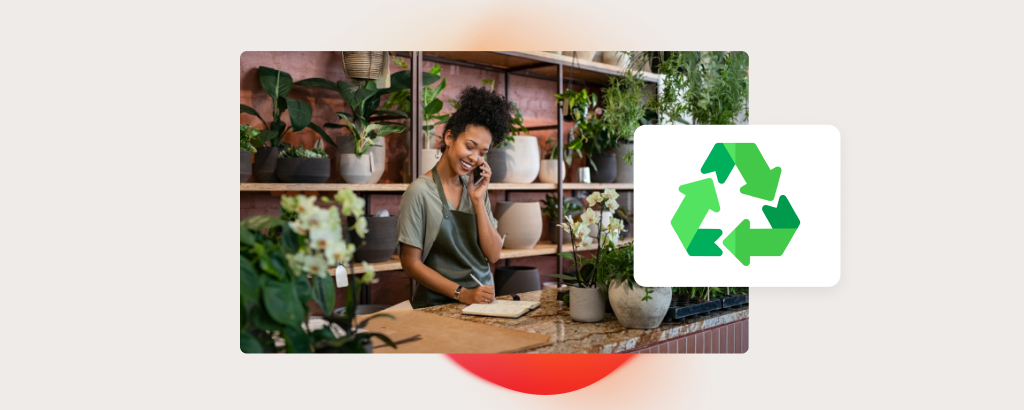In an era where environmental consciousness is no longer a niche concern but a global imperative, consumers are increasingly voting with their wallets for brands that align with their values. For e-commerce businesses, embracing sustainability isn’t just a moral choice; it’s a strategic advantage that can drive growth, enhance brand reputation, and attract a loyal customer base.
The shift towards sustainable e-commerce is gaining significant momentum. A recent study by Accenture found that 62% of consumers are willing to pay more for sustainable brands. This powerful statistic underscores the growing demand for environmentally responsible businesses.
Here are three key areas where your e-commerce business can make a significant impact:

1. Embrace Eco-Friendly Packaging: Reduce, Reuse, Recycle
The packaging that protects your products during transit often ends up in landfills, contributing to pollution. The Ellen MacArthur Foundation reports that only 14% of plastic packaging is collected for recycling globally, highlighting the urgent need for alternatives. Shifting to eco-friendly packaging is one of the most visible ways to demonstrate your commitment to sustainability.
- Choose wisely: Opt for materials that are recyclable, compostable, or biodegradable. Think corrugated cardboard, kraft paper, mushroom packaging, cornstarch-based alternatives, or even reusable pouches.
- Minimise excess: Reduce the amount of packaging used. Can you fit items into smaller boxes? Can you eliminate unnecessary fillers? Every bit of reduction helps lower your carbon footprint.
- Eliminate plastic: Where possible, replace single-use plastics with sustainable alternatives. This appeals directly to eco-conscious consumers who are actively trying to reduce their plastic consumption.
For Caribbean businesses: Given the unique environmental challenges faced by small island developing states (SIDS), particularly regarding waste management and limited landfill space, the adoption of eco-friendly packaging is especially critical. Consider sourcing local, sustainable materials where available, or exploring regional partnerships for packaging solutions that minimise import-related carbon emissions. Education campaigns on how to properly dispose of or reuse packaging can also empower local consumers.
In Dominica, where the government has already instituted a ban on single-use plastics and Styrofoam®, businesses are leading the way in sustainable packaging. A great example of this is Benjo Seamoss and Agro-Processing Limited, a business that bottles drinks made from sea moss, a natural resource. According to a case study from the International Labour Organisation, the owner, John Robin, has built a business with minimal negative environmental impact, from using local ingredients to using eco-friendly bottling materials. This approach not only aligns with national policies but also resonates with environmentally conscious consumers. It’s a great example of how businesses can adopt a green stance to grow revenue and support a circular economy.

2. Partner with Ethical Suppliers: Supply Chain with a Conscience
Sustainability extends beyond your immediate operations to your entire supply chain. Working with suppliers who prioritise ethical and sustainable practices is a crucial step in building a truly responsible brand. A Nielsen IQ study revealed that 78% of US consumers say a sustainable lifestyle is important to them, and they are more likely to buy from companies committed to positive social and environmental impact.
- Prioritise sustainability: Seek out suppliers who use renewable resources, have energy-efficient production processes, or minimise water waste.
- Fair trade practices: Ensure your suppliers uphold fair labour practices, pay living wages, and maintain safe working conditions. Consumers are increasingly interested in the human element behind the products they buy.
- Showcase partnerships: Don’t just do good; tell your story. Highlighting your ethical partnerships on your website and marketing materials attracts customers who care about supporting environmentally and socially responsible businesses.
For Caribbean businesses: Building resilient and ethical supply chains in the Caribbean can involve supporting local farmers, artisans, and manufacturers who adhere to sustainable practices. This not only reduces your carbon footprint by shortening transportation distances but also contributes directly to local economic development and community well-being. Explore certifications like Fair Trade or organic sourcing, where applicable.
Your supply chain is a powerful tool for sustainability. Ethical partnerships ensure your entire business model is environmentally sound. In Saint Lucia, the hotel industry is leading this charge, and Sandals is an excellent case study. The company has integrated various environmental innovations, including using local suppliers for its food and promoting green tours that support local, eco-friendly vendors. This approach ensures that their economic benefits are shared with local communities and that their tourism footprint is as light as possible. By partnering with eco-friendly businesses, a company can extend its own commitment to sustainability across its entire network.

3. Offer Carbon-Neutral Shipping: Deliver with a Lighter Footprint
Shipping is a significant contributor to carbon emissions in e-commerce. According to Shopify, more than 70% of consumers globally say they care about sustainability and climate change, and are actively seeking brands that offer sustainable shipping options. Offering carbon-neutral shipping options allows your customers to feel good about reducing their environmental impact, giving your brand a competitive edge in sustainability.
- Partner with green carriers: Explore logistics providers who invest in electric vehicles, optimise delivery routes, or use sustainable fuels.
- Offset emissions: If fully green carriers aren’t an option, partner with organisations that provide carbon offsetting programs. These programs invest in projects (like reforestation or renewable energy) that reduce an equivalent amount of carbon emissions elsewhere.
- Transparent communication: Communicate your carbon-neutral shipping options to your customers. Let them know how their choice contributes to a positive environmental impact.
For Caribbean businesses: Given the reliance on air and sea freight for many imports and exports, carbon-neutral shipping can be a complex but impactful area. Explore regional logistics providers who are investing in more efficient vessels or look into local carbon offsetting initiatives that benefit Caribbean ecosystems, such as mangrove restoration or renewable energy projects. Collaborating with other local businesses to consolidate shipments can also reduce overall emissions.
While this practice is still nascent in the Caribbean, businesses are leading with green logistics and energy solutions that will pave the way for carbon-neutral shipping in the future. In Guyana, Demerara Bank powers most of its branches with solar energy, and it has developed a financing program for other companies to do the same. This investment in solar energy and low-carbon operations is a foundational step toward a cleaner logistics system, demonstrating that a commitment to renewable energy can start at the corporate level and expand to a wider network.

Beyond the Tips: The Holistic Approach
Implementing these sustainable e-commerce tips is a journey, not a destination. It requires ongoing commitment, research, and adaptation. By integrating eco-friendly packaging, ethical sourcing, and carbon-neutral shipping into your business model, you’re not just making sales; you’re building a brand that resonates with conscious consumers and contributes positively to the planet. This holistic approach strengthens your brand, fosters customer loyalty, and positions your business for long-term success in a world that increasingly values sustainability.
Ready to integrate sustainability into the workflow aspects of your e-commerce business, from paperless operations to eco-friendly digital receipts? Explore the Buzz Cloud today and discover how our platform can help you digitise your business and benefit from the power of e-commerce!



